This article needs additional citations for verification .(June 2024) |
Germain Jousse (November 20, 1895, in Coulaines - March 21, 1988, in Monblanc), was a member of the French Resistance during World War II.
This article needs additional citations for verification .(June 2024) |
Germain Jousse (November 20, 1895, in Coulaines - March 21, 1988, in Monblanc), was a member of the French Resistance during World War II.
In 1914 Germain Jousse conscripted into the army. Promoted to second lieutenant in June 1915, he held the role of company commander from June 1916 and became lieutenant in November of the same year. Wounded at Saint-Dié on October 1, 1917, he rejoined his unit after one month of hospitalization having refused any recuperation. Promoted to captain in April 1918, he was decorated with the Légion d'honneur on the battlefield in September 1918, for having advanced to the position of Celles-sur-Aisne and for having destroyed an enemy company and capturing numerous prisoners. [1] [2]
In 1919, he was sent to Turkey with the 412th Regiment to fight the 'Kémalistes'. Wounded on May 1, 1921, he was made prisoner after hard combat and only returned to France in 1922. In 1925 he was allowed into the École supérieure de guerre , and he then served in Algeria. In 1935 he was promoted to major and transferred to Kabylie with the 9th Regiment of Zouaves until 1938. In August 1939 he joined his station of mobilization as Chief of the 3rd Office of the Staff of the Commander in chief of the Theatre of operations of North Africa. In June 1940 with the High Command, he vainly proposed various solutions for the continuation of the fight against Germany, which he considered possible in North Africa. He was then transferred, still as Chief of the 3rd Office to the Staff of the 19th Army Corps of Algiers.
In spring 1941, continuing to refuse defeat, he secretly took part in the establishment of a plan of allied intervention in North Africa, with some comrades from the circles of General Maxime Weygand and Marshal Philippe Pétain. Others like him such as Captain Beaufre and the commanders Dartois and Loustanau-Lacau were denounced, arrested and executed. He himself only just escaped from the same fate. Promoted to the rank of lieutenant-colonel in September 1941, he did not discontinue to work for the resistance in secret, by drawing up notes evaluating the technical bases for a future allied invasion of North Africa. In January 1942, he became military adviser to the Algiers resistant group directed by Henri d'Astier de la Vigerie and José Aboulker. In disgrace, under Vichy orders he was put in control of regulating supply transport bound for the Rommel army, in accordance with the agreements passed through the general delegation of Weygand and Germany (Dankworth Contract). He benefitted from it as he was able to provide information for the allied secret services, all the while endeavouring to slow down and block the transports bound for the Afrika Korps.
From, June 1942, appointed Garrison Major in Algiers, Colonel Jousse actively prepared for the Algiers uprising, storing weapons and contributing to choosing the locations which would be occupied. He himself took part in the execution of the November 8 Putsch and opposing the Vichyist 'plan of the maintenance of law and order' which was intended to be opposed to any invasion. Thus he would facilitate the occupation of strategic points by the resistance by providing them 'VP' arm-bands - 'Public Volunteers', with letters from the Public Commander destined for the military collaborationists, with mission orders to raise the state of security. He personally carried out the arrest of General Louis Koeltz, Commander of the Algerian 19th Army Corps, and went onto the battlefront to put an end to the fire of a resistance battalion protecting the invasion point of Sidi Ferruch for the American troops. The success of the putsch can be attributed to Germain Jousse, who allowed 400 armed civilians to arrest General Juin, Commander in chief, as well as the collaborationist Admiral Darlan, and who paralysed the mobilisation of the Vichyist 19th Army Corps during the 15 hours in which the Allied forces unloaded unopposed, encircled Algiers, and achieved surrender the same evening with its port intact.
Colonel Jousse participated in the Tunisian Campaign within the General British Staff from November 1942 to March 1943. In April he was named the Chief of the Staff of General Georges Catroux in Algiers. Then promoted to Colonel, he became assistant manager of the Staff of General Charles de Gaulle in Algiers. He was then assigned to the Directorate-General of Studies and Research (DGÉR), where he took command of the documentation service. In 1944, he accepted his stars as Brigade General, and in 1946 was promoted to Division General.
Thereafter Germain Jousse commanded the 5th Military Region in Toulon, and, in July 1952, was promoted to the rank of Army Corps General. He was, in addition, the first president of the Association of the French Liberation of November 8, 1942.
He died on March 21, 1988, in Monblanc in Gers. He was buried in Mans dans la Sarthe.
His decorations were as follows:
General Jousse also published two works:

Maxime Weygand was a French military commander in World War I and World War II, as well as a high ranking member of the Vichy regime.
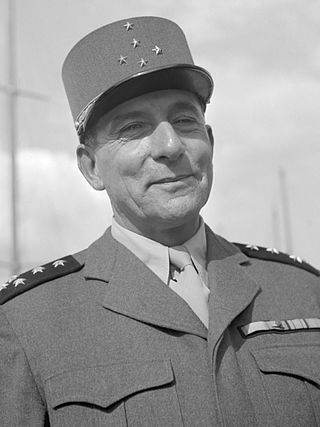
Jean Joseph Marie Gabriel de Lattre de Tassigny was a French général d'armée during World War II and the First Indochina War. He was posthumously elevated to the dignity of Marshal of France in 1952.

Alphonse Pierre Juin was a senior French Army general who became Marshal of France. A graduate of the École Spéciale Militaire class of 1912, he served in Morocco in 1914 in command of native troops. Upon the outbreak of the First World War, he was sent to the Western Front in France, where he was gravely wounded in 1915. As a result of this wound, he lost the use of his right arm.

Henri Eugène Navarre was a French Army general. He fought during World War I, World War II and was the seventh and final commander of French Far East Expeditionary Corps during the First Indochina War. Navarre was in overall command during the French defeat at the Battle of Điện Biên Phủ.

José Aboulker was an Algerian Jew and the leader of the anti-Nazi resistance in French Algeria in World War II. He received the U.S. Medal of Freedom, the Croix de Guerre, and was made a Companion of the Liberation and a Commander of the Légion d'honneur. After the war, he became a neurosurgeon and a political figure in France, who advocated for the political rights of Algerian Muslims.
Bernard Karsenty, was a member of the French Resistance during World War II. He was a leader of the Algiers putsch of 1942.

Edgard de Larminat was a French general, who fought in two World Wars. He was one of the most important military figures who joined the Free French forces under the British in 1940. He was awarded the Ordre de la Libération.
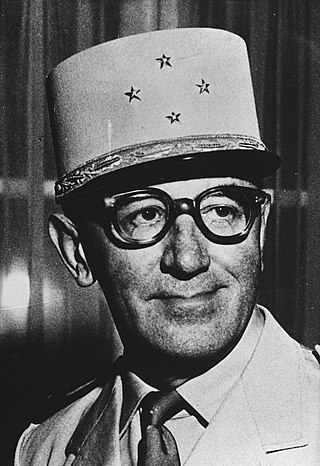
Fernand Gambiez was a French Army general and military historian who fought in World War II, the First Indochina War and the Algerian War. During the Algerian War, Gambiez was commander-in-chief of the French Army in Algeria.
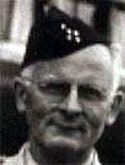
André Zeller was a French Army general. He served during World War I, the Franco-Turkish War, and World War II, and served as chief of staff of the French Army during the Algerian War.

Jacques Marie Alfred Gaston Faure was a French Army general and skier. He was the leader of the French national Olympic military patrol team in 1936 which placed sixth and in 1961 one of the masterminds of the Algiers putsch.
Jean Raoux was a French général de brigade, who began his career during the Second World War and later fought in Indochina and Algeria.
René Jacques Adolphe Prioux was a French general who served in both world wars. A cavalry officer of great talent, Prioux rapidly rose through the officer ranks and commanded the Cavalry Corps of the First Army during the Battle of Belgium in May 1940. He was captured by the Germans and spent two years as a prisoner of war. Repatriated in 1942, Prioux came to be seen as a strong supporter of the Vichy regime and was consequently removed from a position of authority in the French Army by Charles de Gaulle, the leader of the Free French, after the landings in French north Africa by U.S. and British forces in November 1942.

Bernard Janvier is a former general of the French Army who served in the French Foreign Legion, primarily spearheading and putting in place effective resolving forces.

Emmanuel Charles Mast was a major general who participated in the liberation of North Africa in 1942 and was Resident General of France in Tunisia between 1943 and 1947.

Alfred Touny was a French soldier, lawyer and businessman who became one of the leaders of the French Resistance during World War II (1939–45). He was arrested by the Gestapo towards the end of the war and shot.

The Géo Gras Group was a French resistance movement that played a decisive role during Operation Torch, the British-American invasion of French North Africa during World War II.
René Morel (1908-1974) was a Général de division of the French Army and Commandant of the Foreign Legion.

Gabriel, Marie, Joseph Bougrain was a general of the French Army who commanded the 2nd Light Mechanized Division during World War II. He is buried in the cemetery of Sainte-Marie-de-Ré.
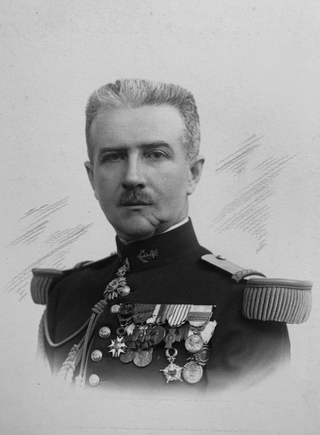
Pierre-Étienne de Perier was a French divisional general, Grand Officer of the Legion of Honour, and magazine editor.
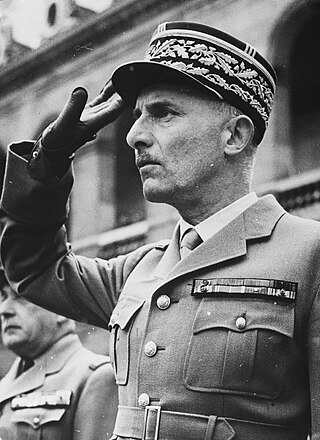
Henri Zeller was a French Army general and member of the Resistance organization of the French Army during World War II.